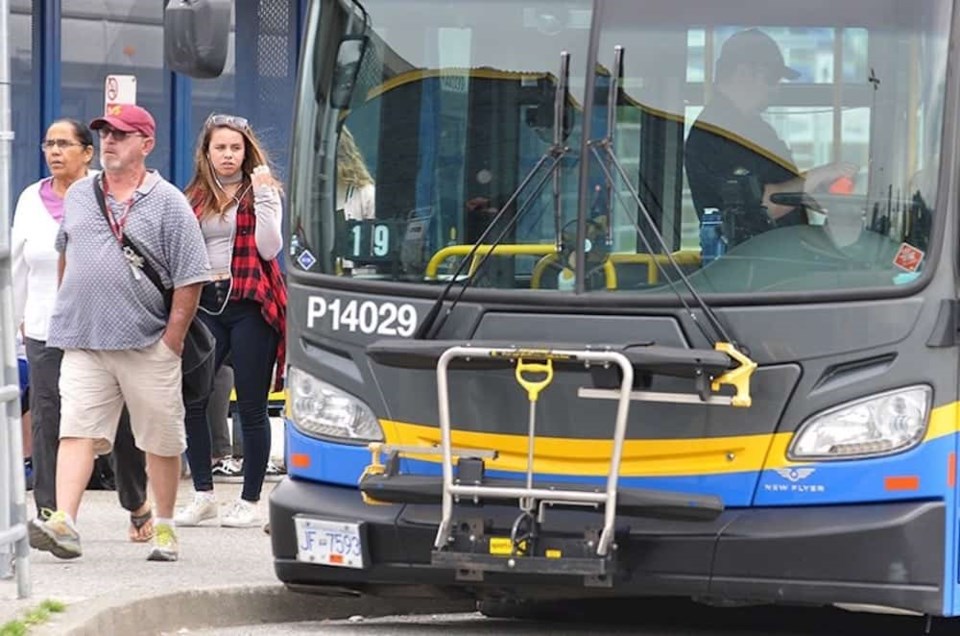Will TransLink try to get some of its before the next labour negotiation?
Following a lengthy labour dispute that brought across Metro Vancouver for 48 hours and threatened to shut down the entire transportation network, including the SkyTrain, sa国际传媒 Line, and the West Coast Express, many people have expressed concern that one of several unions under the TransLink umbrella could force operations to halt again in the future.
But the transit authority says it isn't planning to get any of its services deemed essential now that CUPE 4500 — the union representing 180 transit supervisors — has reached an agreement with Coast Mountain Bus Company (CMBC).
Spokesperson Tina Lovgreen told V.I.A. that the transit authority will "request that all applications relating to TransLink be dismissed by the Labour Relations Board (LRB)" following the ratification of a collective agreement between the two parties.
On Tuesday, Feb. 6, the union and CMBC signed a new three-year agreement, which will expire on Dec. 31, 2025. The union said it made "significant progress" on its key issues.
While the supervisors' union won't strike during this time, other transit unions could commence job action when their contracts expire. There also isn't anything stopping CUPE 4500 from striking in the future if talks break down again.
John-Henry Harter, a professor of labour studies at Simon Fraser University (SFU), says employers who are concerned about their services not being available to the public can file to have them deemed essential well ahead of any planned job action. They can do this around three months before an agreement is slated to expire, allowing the labour minister to decide if the services meet the criteria.
Since TransLink didn't file for an essential service designation until the 11th hour — and because they aren't following up on the issue — Harter believes it may have been used as a bargaining tactic.
"You're supposed to as an employer talk about essential service [designations] three months before the collective agreement expires," he told V.I.A.
"[TransLink] didn't just come to this realization."
What makes a service essential in British Columbia?
While many people use public transportation to get to work, school, medical appointments, and other important meetings, transit services may not always meet sa国际传媒's criteria of an "essential service."
During the pandemic, Emergency Management BC worked with provincial health officer Dr. Bonnie Henry to develop a that were "essential to preserving life, health, public safety and basic societal functioning," including medical services, bank operations, port facilities, emergency responders, child-care services, grocery stores, and many others.
But services that provide "basic societal functioning" don't necessarily fit the description of an essential service under sa国际传媒 law.
A service may be essential if its loss poses "a of the residents of British Columbia," according to the Labour Relations Code, Section 72.
Under this definition, the temporary loss of a service may significantly hamper basic societal functioning but wouldn't necessarily threaten the "health, safety, or welfare" of a society, Harter explained.
"Essential services are supposed to be about preventing immediate danger," he said. "We can get to work many different ways."
While many services are "important," there is a larger debate about the definition of essential. For example, bus services are useful and convenient but not necessary to get to work; people can use ride-hailing services, taxis, car shares, or bikes.
Temporary loss of bus services — or a complete shutdown of TransLink's network — poses a significant inconvenience to commuters. But strikes are one of the most effective tools unions have to use against employers who refuse to bargain with them, says the professor.
Harter says these discussions "shouldn't be on the backs of workers" negotiating new contracts and if an employer wants its services deemed essential that discussion should happen before an agreement expires.
Should transit services be deemed essential?
Some transit services have been deemed "essential" by the LRB. For example, HandyDart, TransLink's door-to-door service for people who are unable to navigate conventional public transit without assistance, was deemed an essential service since it poses an immediate risk to the welfare of people who rely on it; individuals who rely on it may not be able to access other forms of transportation.
Many people have argued that all of TransLink's services are essential — and putting them on pause threatens the region's most vulnerable people.
Lawrence Frank, professor of urban studies and places at UC San Diego (formerly of UBC), told V.I.A. in a previous interview that housing is
This means that many of the people who can't afford sky-high rent prices in places close to SkyTrains and other centrally located spots don't have transit alternatives for getting to work when bus services are shut down.
"It is clearly the people that are the most impacted that are transit-dependent," he said. "This is throwing a wrench at the most vulnerable population."
sa国际传媒's debate around the definition of an essential service started in the mid-1970s just after the inception of the LRB. At that time, the board discussed what government-provided services were key to the health and well-being of citizens — but the discussion is continually revisited each time an employer files for the designation.
Since TransLink isn't following up with the LRB, its motives were "disingenuous," Harter added.
"I find it a bit odd that they want to get an emergency ruling in the middle of a strike...it's convenient."

